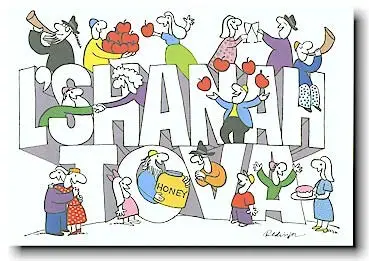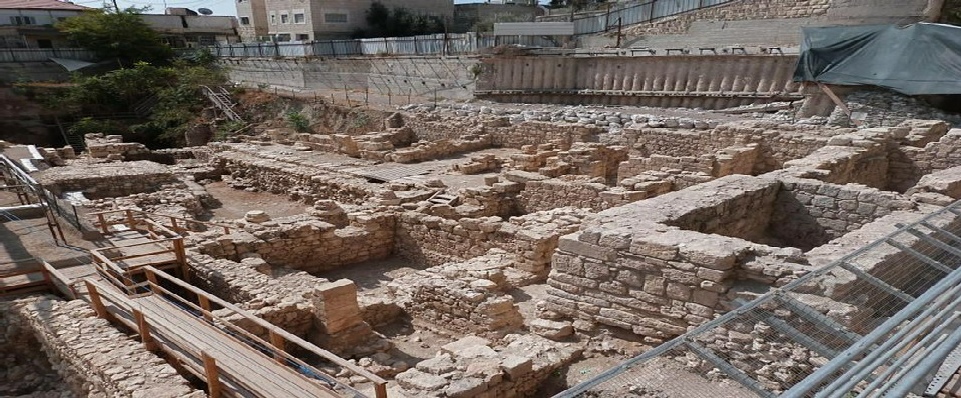
Begins sundown on the eve of Tishrei 1 (Oct. 2, 2024) and ends after nightfall on Tishrei 2 (Oct. 4, 2024).
| L’Shanah Tova! (Happy New Year!) Rosh HaShanah! (Head of the year!) Our happy celebration of a new year comes technically in the 7th month (Leviticus 23:24) of the Jewish calendar year which begins in Spring (Passover time‐month of Nissan). Thus, this really is a celebration of the end of the harvest season and the commencement of nature’s new year. It is elevated by every individual taking stock of himself as the King of Kings begins a new year of reigning in judgment over His creation. At least, this is the traditional belief passed down to us throughout the centuries. |
| That is why this day is marked by special prayers that express God’s greatness, His Covenant with us, and our dedication to Him and to the Covenant, with hope for a united mankind; and why it ushers in the ten most solemn days of the calendar year, known as Teshuva (repentance or return). While Rosh HaShanah is marked by celebrating, it also has a serious undertone as it is believed that this is the day God decides whether to write each man’s name in the Book of Life for another year. Tradition believes that even if God chose not to write your name in the Book of Life, God’s mind can be changed during the next ten days, before the books are sealed shut. That is why this period of time, also known as the ten days of awe, is dealt with so seriously and solemnly. Man has these few days to influence God that he will live his life more piously and religiously. It is during this time that he must go to his fellow‐man and make everything right between them and hope in so doing, he is also making everything right between God and himself. On the tenth day, Yom Kippur, the books are sealed shut and man’s fate is set for the following year. |
| In this article, we will not deal with Yom Kippur (see Yom Kippur link for further information), so let us back up and relate what else takes place on Rosh HaShanah. The shofar is blown 100 times in the temple. This is probably based on Rabbi Meir’s comment that a Jew must recite 100 blessings every day and since the hearing of the shofar is considered a blessing, this fulfills that commitment. It reflects Psalm 89:16, which states: “In Thy Name they rejoice all the day…” |
| It is also interesting to note that the Talmud states that the shofar is blown that often to confuse Satan and prevent him from bringing other charges against the Jews before God. It is believed that when he hears the shofar being blown so much and so often (once every day in the month, Elul, preceding Rosh HaShanah as well as the 100 times on Rosh HaShanah) that he will believe Messiah has arrived and his (Satan’s) influence and power over the people is now ended. |
| Other interesting facts about the shofar are that the root of “shofar” means hollow and it is a hollowed out horn of a kosher animal. It must be a ram’s (or related kosher animal) horn in |
| commemoration of the near‐sacrifice of Isaac. It cannot come from a bull as that is a reminder of the golden calf that the children of Israel worshipped while in the wilderness. It can be no shorter than four inches, but there is no limit on length. It can have no cracks or holes, nothing can be added to it, but it can be carved into. It is bent to represent our hearts are bent toward God and it is brought alive by the breath of man. It sounds alone to remain a pure voice piercing the quietness. |
| It is a symbol of revelation and redemption. It is also one of the oldest natural wind instruments known unto man. In Bible times it was used to intimidate the enemy, declare war and as a call to the populous to assemble. |
| When blown for Rosh HaShanah there is a series of sound given: Tekiah (one long blast) Shevarim (three short blasts to sound like a broken heart) Teruah (9 stacatto sounds – like a whimpering soul) and finally, Tekiah Gedolah (one long blast until the one blowing runs out of air). These sounds are to make one conscience that they are standing before God and now it is critical to appeal for a year of blessings, peace, and forgiveness; a year unmarred by sin. |
| During the afternoon of Rosh HaShanah, the ceremony called “tashlich” takes place. This is the act of emptying one’s pockets of crumbs (placed there previously for this purpose) over a body of flowing water (stream, river, etc.). It is symbolic of one emptying himself of his sins and the water carrying the sins away, to be remembered no more. |
| As has been previously mentioned, the Ten Days of Awe or Repentance are ushered in with the beginning of Rosh HaShanah and end with Yom Kippur, the Day of Atonement (for further information see link to Yom Kippur). During this time, the days of probation, the shofar is not heard (in direct contrast to how much it has been heard in the previous month). It will finally be blown again to signify the end of Yom Kippur. |
| As Jewish believers in Y’shua Jesus, we recognize Rosh HaShanah, and can rejoice with our people over the agricultural blessings having been harvested and a positive look toward God’s future blessings, too. However, we do not believe that God stands in judgment on his people during the ten days of awe. |
| We believe in the atoning work of Y’shua Jesus, by which we mean that He was fully God and fully man when He walked this earth in the beginning of the 1st century a.d. He lived a perfect and sinless life and thus was not under the penalty of sin common to all mankind, which is death. Therefore, His life could be given in place of any who will receive His substitution. Leviticus 17:11 tells us that the life of the flesh is in the blood and God has given it to us upon the altar for the forgiveness of sin, for the atonement of the soul. Therefore, through the death, burial, and resurrection of Y’shua Jesus, He paid the price for the redemption of our souls. If we believe on Him and accept His work in our stead, we can have forgiveness of all our sins (past, present and future) and can come to God the Father, through Him. |
| Therefore, we do not believe that each year we must try to attain forgiveness to be written in the Book of Life. We have the assurance of the heart that God has promised us Eternal Life with Him, through the atoning work of His Son, God the Son, Y’shua ha Moshiach (Jesus, the Messiah). |
| We pray you will come to understand this truth fully for yourself and will be able to rejoice in the God of your salvation, as we do. Exodus 15:2: “The Lord is my strength and my song, and He has become my salvation…” Acts 4:12: “…for there is no other name under heaven given among men, whereby we must be saved.” John (Yohannon) 3:16: “For God so loved the world, that He gave His only begotten Son, that whosoever believes in Him, shall not perish, but have everlasting life.” |
